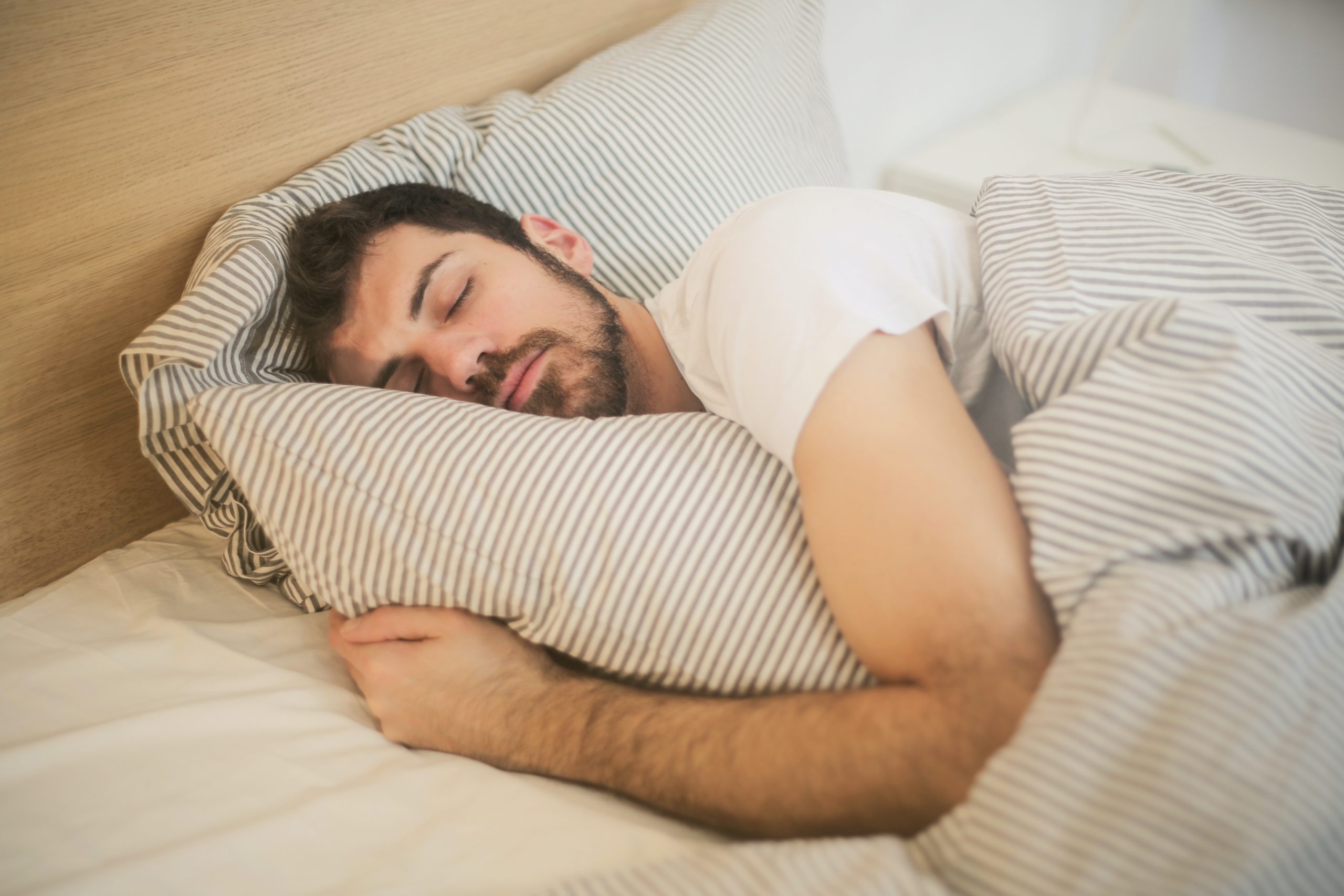
Man sleeping
If you are exhausted from your unexplainable lack of sleep, it may be time for you to try natural remedies for insomnia. It’s normal to have occasional struggles getting a good night’s rest, but trouble sleeping night after night can interfere with your quality of life. Insomnia, a sleep disorder characterized by the inability to fall or remain asleep throughout the night, has many causes. Read on for some natural remedies for insomnia that may help you finally get a good night’s sleep.
Manage Your Mental Health
Managing your mental health is one of a few natural remedies for insomnia you might not think of right away. Stress, anxiety, depression and other mental health issues result in numerous physical symptoms, such as insomnia. When you feel distressed, your body has a much harder time getting into a state of relaxation, which can result in hours spent lying awake or tossing and turning.
Caring for your mental health involves both proactive and reactive remedies. Thanks to research, studies on brain chemistry, social stress factors, and hemp processing, there are several medication-free ways you can respond to mental health symptoms. Consider what troubles you and prevents you from feeling your best and make a list of solutions you can turn to when you start to notice mental or emotional discomfort. Reach out for social support, journaling, therapy, organic CBD oil, acupuncture and other forms of healing self-care.
Watch Your Diet
Each of your bodily processes is greatly influenced by the foods and beverages you choose to consume, including your ability to sleep. Caffeine and nicotine can interfere with your ability to get high-quality shut-eye, but other elements of your diet may have a significant impact on whether you experience insomnia, too.
Habits such as snacking too late at night, eating too much sugar, drinking too much alcohol, consuming overly processed foods and skipping over nutritious foods can result in sleep troubles. Several foods cause blood sugar spikes or sleep disruptions, while others don’t give your body what it needs to function properly.
To get better sleep at night, focus on healthful foods rich in magnesium, healthy carbohydrates, lean proteins, vitamin b6, healthy fats and natural sugars. While you should avoid caffeine beyond the late afternoon, alcohol can also cause poor sleep quality and should be avoided in excess or too close to bedtime.
Get Regular Exercise
Research has shown that those who exercise regularly, at least 150 minutes of aerobic activity throughout the week, sleep longer and soundly throughout the night. Exercise releases feel-good endorphins that boost your mood and reduce stress. Regular physical activity also reduces muscle tension and promotes better sleep by expending both physical and mental energy long after you change out of your tennis shoes.
An exercise regimen is one of the best natural remedies for insomnia as long as it’s performed on a consistent basis and during the appropriate time of day. Exercise performed too close to bedtime can increase your energy and adrenaline levels, which makes it more difficult to wind down when it’s time for sleep.
Use Supplements
In addition to retraining your brain and body for better sleep through improving your habits, sometimes you need a little assistance to get your body back on a consistent schedule. Rather than turn to synthetic chemicals or prescription sleep aids, these natural supplements can help.
Melatonin
Because your body produces this sleep-inducing hormone naturally, melatonin supplements are a great way to gently promote sleep. Melatonin supplements have been shown to improve sleep quality by helping individuals to fall asleep easier and maintain a higher sleep quality before the sun comes up.
Magnesium
In addition to boosting your heart and brain health, magnesium supplements have a calming effect on the body. Magnesium helps to regulate your body’s natural melatonin levels, plays a role in muscle relaxation and increases brain chemicals that combat stress. Those with sufficient magnesium levels report better sleep quality, including a shorter period before falling asleep.
Chamomile
Chamomile has historically been used as a relaxing herb to relax muscle tension, minimize stress, and treat insomnia. While you can find chamomile in capsule or liquid form, many people find relief by drinking a hot cup of chamomile tea before bed as a natural remedy for insomnia.
Try Gentle Yoga
Yoga has been used for centuries to increase mind-body connections and relieve stress and anxiety, which can promote sleep. Yin yoga, a slower form of practice, has been shown to alleviate tension and slow your system down.
Yoga is best performed within a few hours before bed or as part of a soothing bedtime routine. Keep in mind that quick movements or difficult poses that increase your heart rate may have the opposite intended effect if done too close to bedtime.
Create a Solid Routine
While insomnia has many causes, it may also be the result of poor bedtime habits. Many people who experience consistent sleep troubles often find changing their night time habits improves their quality of sleep. A consistent bedtime routine, an electronic sundown, a solid bedtime, and a series of soothing activities can go a long way in readying your body and mind for sleep.
Because your body relies on its internal circadian rhythm to know when it’s time to sleep and when it’s time to be awake, it’s important to stick to a steady routine, including a bedtime you adhere to daily.
Establish a time that will allow you to get at least seven to nine hours of sleep each night. Cut off the use of electronic devices that emit blue light at least half an hour before your bedtime. Instead, choose soothing, relaxing activities to wind your system down. When you give your body as many signals as possible to indicate it’s time for sleep, you set your system up for a better night’s rest.
